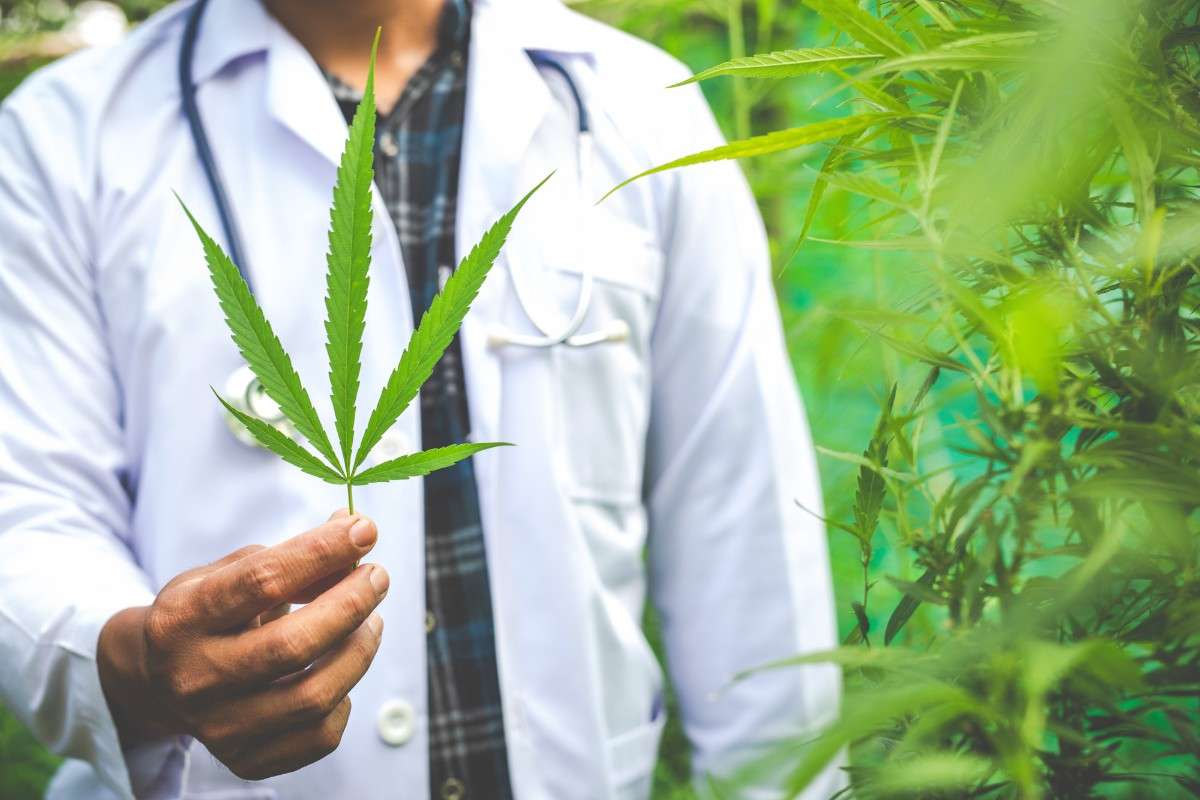Lately, you may have heard a lot of good things about CBD and its therapeutic potential. It seems to have become the remedy par excellence for so many ailments ranging from anxiety to insomnia, from depression to heart disease.
But does it really only bring benefits or is there a price to pay?
In a nutshell: is CBD bad for your health?
If it is a remedy for so many ailments, this means that it can be used numerous times and for longer or shorter periods of time. This automatically triggers doubts as to whether it is safe, whether it can be addictive or even whether side effects may occur over time.
The fact that it is a natural remedy is reassuring. But that does not detract from the fact that we are talking about a potent product that is extracted from the cannabis plant, which has raised and continues to raise objections worldwide.
Everyone on the web is talking about its beneficial properties, which is why we decided to create a guide to tell you about the other side of the coin, which is very often not said. Let’s find out together whether CBD is bad for your health or not.
Let’s learn about CBD
CBD is the abbreviated name you see on all websites and on product labels in physical shops. In reality, this active ingredient produced by the hemp plant is called cannabidiol.
Cannabis produces over a hundred cannabinoids, a group of substances to which both CBD and THC belong. The latter is what has caused marijuana to be labelled a ‘narcotic substance’.
CBD, unlike THC, does not cause any high the moment it enters the body. And THC, in its low percentage, is also totally safe.
We will see all the benefits of CBD more fully later. Unlike THC, cannabidiol does not cause a mental alteration, but rather a profound sense of relaxation and tranquillity.
Also because it acts on the brain, but not only. Through the receptors of the endocannabinoid system with which it interacts, it is able to regularise the functioning of all the organs of the body and even the immune system.
This is possible precisely because the body already produces similar substances called endocannabinoids. This makes CBD very well tolerated by everyone.
What are the contraindications and side effects of CBD?
Is all that glitters gold, or does CBD also have contraindications? It is true that it is a safe substance that most of the time does not cause discomfort, but in some cases side effects may occur.
It is very rare for this to happen and generally the cause is interaction with other drugs. Side effects of CBD include:
- Dry mouth: both CBD and THC can lead to dehydration, i.e. reduced salivation, from which this harmless but annoying side effect can result;
- Fatigue: CBD is a sedative, in general this is one of its benefits, but especially the first few times it may over-relax and cause a sense of tiredness and fatigue, which is why it is best to test its effects in the evening before going to sleep at first;
- Headaches: as an analgesic it should improve the pain response, although when taken in large quantities it may cause the opposite effect;
- Dizziness: this could be due to either the CBD or the THC component, more studies will be needed to understand what actually triggers it;
- Appetite alterations: in some cases CBD speeds up the metabolism, which is why it is taken with the aim of losing weight, but in other people it may take away the appetite;
- Nausea and diarrhoea: it seems that these are due not so much to the action of CBD as to taking it on an empty stomach, especially when it comes to complex products such as full spectrum oil, in which so many other natural substances are contained that are sometimes difficult to digest.
So CBD is bad for your health? No serious side effects have ever occurred. It all depends on how the product is used.
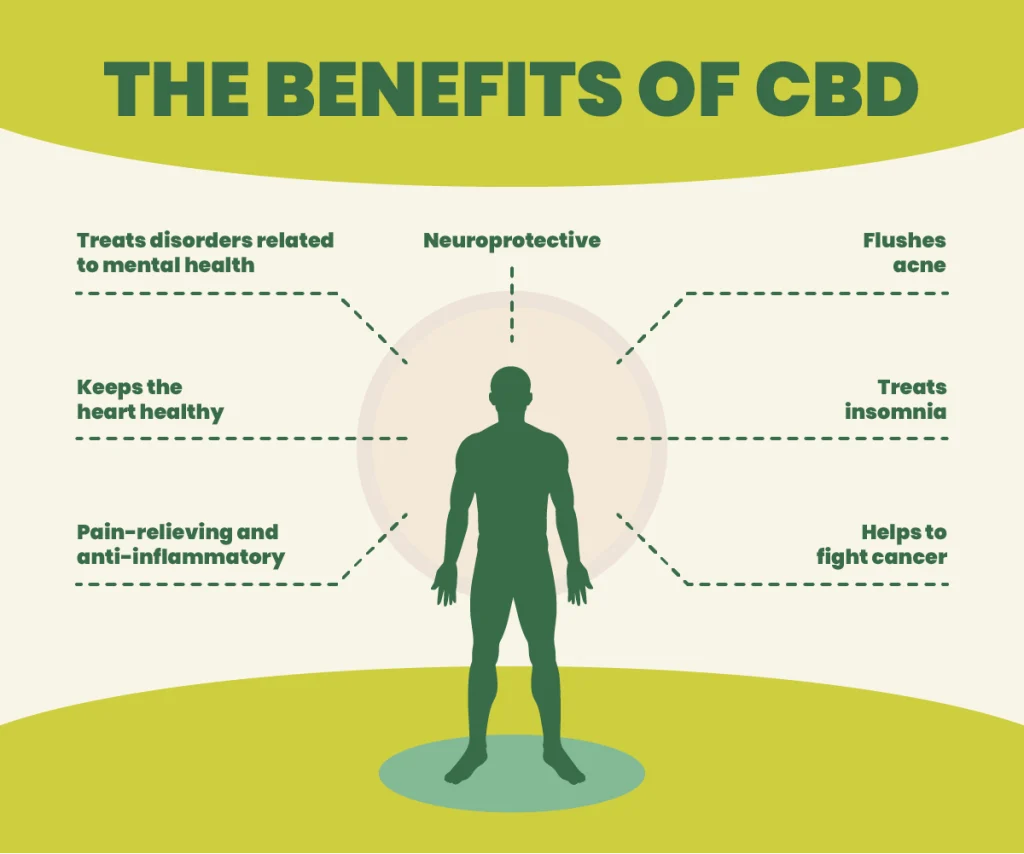
Is dry mouth a side effect of CBD?
CBD may cause dry mouth, a relatively common side effect among those taking cannabinoid products. This phenomenon occurs due to the interaction of CBD with the endocannabinoid system, especially with the receptors in the salivary glands.
When CBD binds to these receptors, it can temporarily inhibit saliva production, leading to a dry mouth sensation, also known as ‘xerostomia’.
Which drugs can cause contraindications by interacting?
During scientific studies, most of the cases where side effects occurred were due to interactions with other drugs.
CBD can interact with some drugs for three main reasons:
- Metabolism: CBD is metabolised mainly by cytochrome P450 (CYP) enzymes, in particular CYP3A4 and CYP2C19, these same enzymes also metabolise around 90% of all drugs on the market and consequently CBD can compete with other drugs for access to these enzymes, influencing their concentration in the blood and the intensity of their effects;
- Pharmacological effects: CBD has several pharmacological effects of its own, including sedative, anxiolytic and anti-inflammatory effects; these effects may add to or amplify the effects of other drugs, with possible negative consequences;
- Contaminants: among the side effects of CBD oil, one must watch out for contamination by solvents, pesticides, heavy metals, bacteria or fungi when it is of low quality or poorly stored.
Here are some examples of interactions between CBD and drugs:
- Anticoagulants: CBD may increase the effect of anticoagulants such as warfarin, increasing the risk of bleeding;
- Antidepressants: may increase levels of some antidepressants in the blood;
- Anticonvulsant drugs: may increase the risk of side effects such as drowsiness, fatigue, ataxia and confusion, or decrease the effectiveness of drugs in treating convulsions;
- Immunosuppressants: may interact with drugs that regulate an abnormal immune system response;
- Sedatives: may accentuate the effect of drugs such as benzodiazepines, increasing the risk of drowsiness and respiratory depression.
That is why, before taking CBD, it is important to consult your doctor to rule out possible interactions with other drugs.
-
Product on sale
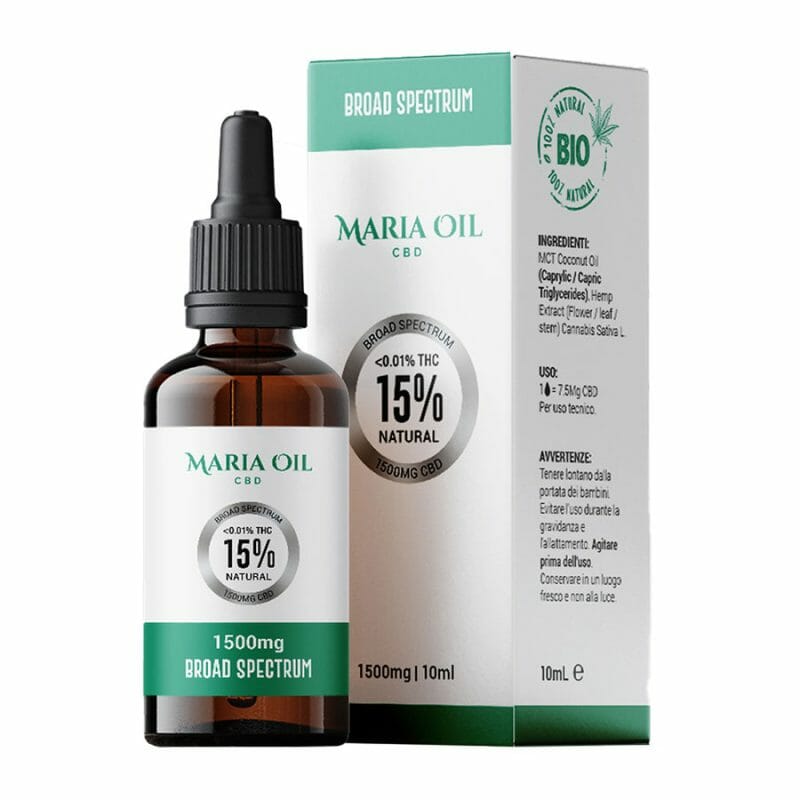 CBD oil 15% (1500mg) Broad SpectrumPrice range: £31.20 through £51.20From 1,71 €/gr
CBD oil 15% (1500mg) Broad SpectrumPrice range: £31.20 through £51.20From 1,71 €/gr -
Product on sale
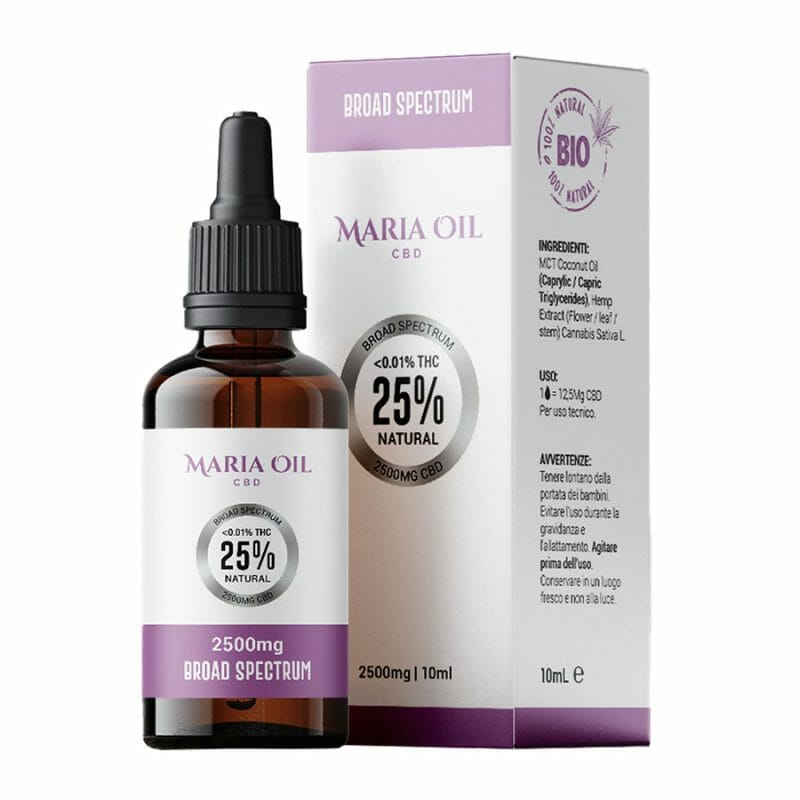 CBD oil 25% (2500mg) Broad SpectrumPrice range: £47.20 through £67.20From 2,24 €/gr
CBD oil 25% (2500mg) Broad SpectrumPrice range: £47.20 through £67.20From 2,24 €/gr -
Product on sale
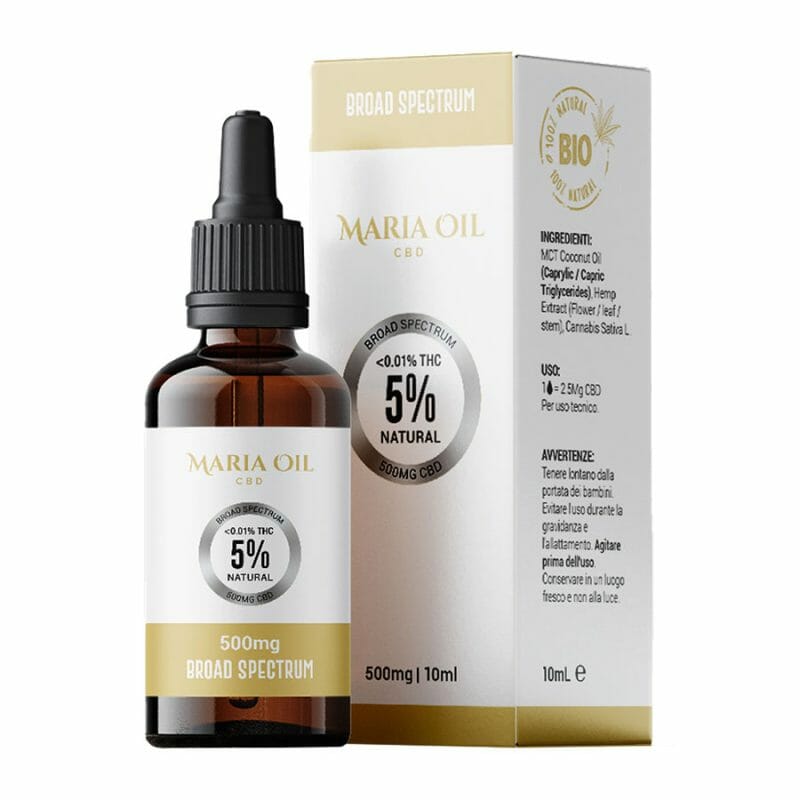 CBD oil 5% (500mg) Broad SpectrumPrice range: £14.25 through £33.00From 1,10 €/gr
CBD oil 5% (500mg) Broad SpectrumPrice range: £14.25 through £33.00From 1,10 €/gr
Can one become addicted to CBD?
CBD prides itself on being able to replace many powerful drugs such as, for example, those to combat insomnia. The latter are very often addictive, meaning that in order to achieve the effect, it is necessary to take them constantly and in increasing quantities.
Does this happen with CBD?
No, not when taking products with a low THC content. It is in fact THC that is most likely to be addictive.
CBD is not a psychoactive substance, it is simply a natural healing substance. It is not physically addictive like, for example, nicotine or caffeine.
This means that there is no risk of falling into a vortex of abuse due to its chemical composition. Obviously, the only problem that could arise is a psychological addiction when the first positive results begin to show.
So, how does CBD act on the brain? It does so via the CB1 and CB2 receptors of the endocannabinoid system, thus in a completely natural way. In addition to this, it inhibits the enzyme FAAH by increasing the production of anandamide and consequently provides a feeling of well-being to the whole body. CBD, unlike many other substances, does not chemically eliminate symptoms but heals the body at the base by compensating the work of the endocannabinoids.
What are the benefits of CBD
And now let us delve into the countless properties of cannabidiol and its beneficial effects, which, fortunately, far outweigh the side effects.
The benefits of CBD are found in so many fields. Its most common effects are seen on pain, even chronic pain, and inflammation. It acts as an analgesic and anti-inflammatory both in the case of trauma and when these symptoms are related to other widespread illnesses.
It is able to treat anxiety, stress and depression in a completely natural way. It therefore has a totally different efficacy and mode of action from normal antidepressant drugs.
Its calming properties also make it perfect for insomnia, which it treats at the root of the problem. It intensifies the heaviest sleep so that the hours spent in bed are truly restful.
It is suitable for treating skin diseases, especially when used topically, i.e. applied locally to the area affected by the ailment.
It also does many other things such as reducing nausea and vomiting, regularising the heart, protecting brain cells, and aiding bone recovery.
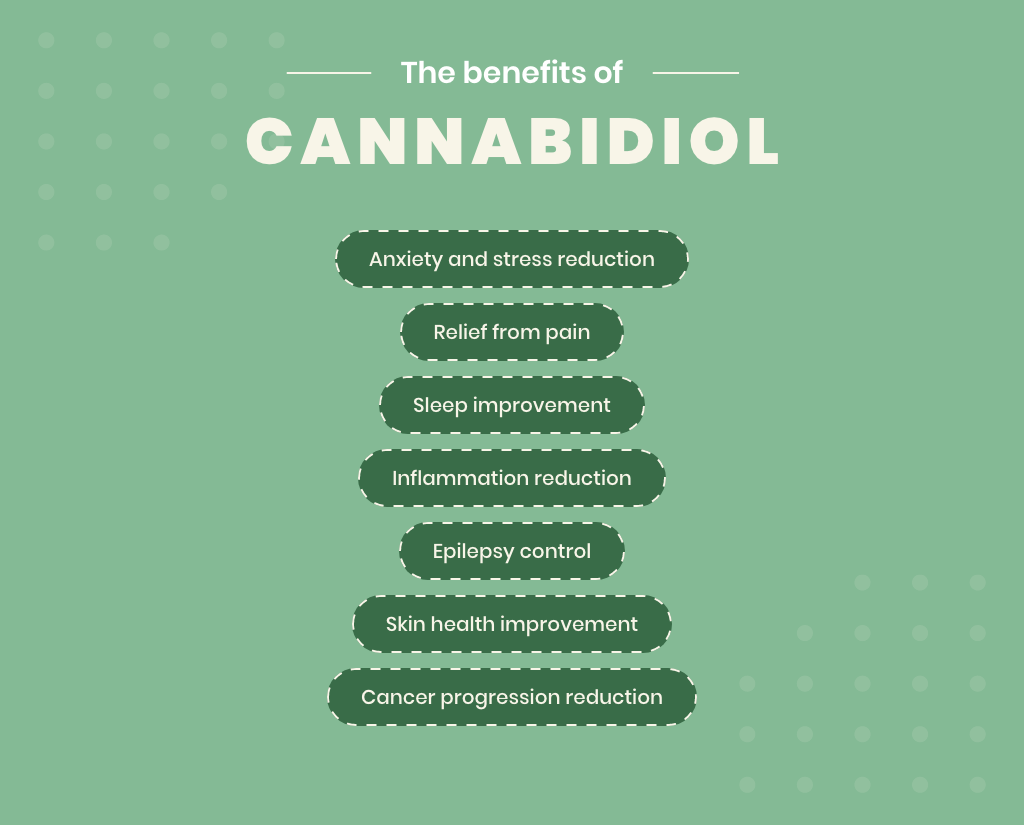
How to know how much CBD to take
The key to avoiding side effects is clearly to take CBD in the correct dosage and according to the recommended methods of use for each individual product.
But if dosage is the key to making the best use of CBD, how do you know which dose is right for you?
Let’s start right away by saying that there is no universal dosage because every individual is unique.
There are several factors that affect the correct dose:
- Age and gender: other body characteristics, but also one’s own internal chemistry, depend on these;
- Body weight: this is decisive as the amount of product to be taken must be related to it;
- Concentration of active ingredient: some products, such as oil, are sold in CBD concentrations ranging from 5% to over 99%;
- Type of product: it may be an isolated product, i.e. containing only CBD, but it may also have a full spectrum formulation with other substances and this also affects the effects;
- Condition to be treated: the disorder may be more or less severe, thus requiring a variable dose of active ingredient;
- Experience with the product: whether it is your first time with CBD or not also has an impact.
Research on CBD dosage has gone as far as testing up to 1,500 mg per day without experiencing any serious side effects.
The rule of thumb to make sure you don’t go wrong is to start with a low dosage and then gradually increase until a positive result is achieved.
-
Product on sale
 CBD oil 15% (1500mg) Broad SpectrumPrice range: £31.20 through £51.20From 1,71 €/gr
CBD oil 15% (1500mg) Broad SpectrumPrice range: £31.20 through £51.20From 1,71 €/gr -
Product on sale
 CBD oil 25% (2500mg) Broad SpectrumPrice range: £47.20 through £67.20From 2,24 €/gr
CBD oil 25% (2500mg) Broad SpectrumPrice range: £47.20 through £67.20From 2,24 €/gr -
Product on sale
 CBD oil 5% (500mg) Broad SpectrumPrice range: £14.25 through £33.00From 1,10 €/gr
CBD oil 5% (500mg) Broad SpectrumPrice range: £14.25 through £33.00From 1,10 €/gr
What happens if I take too much CBD?
Ti tranquillizziamo subito dicendoti che non c’è il rischio di andare in overdose con il CBD, anche perché stiamo parlando di una sostanza naturale non psicoattiva.
Anzi, gli scienziati hanno notato che la somministrazione di una dose eccessiva di prodotto per la cura di un particolare disturbo molto spesso non comporta effetti collaterali, semplicemente si rivela inefficace.
Tuttavia, potrebbero manifestarsi alcune delle controindicazioni che abbiamo detto prima.
Questo potrebbe accadere a causa dell’interazione con altri farmaci ma anche perché potresti aver assunto troppo prodotto la prima volta. Anche in questo caso ti rassicuriamo, gli effetti collaterali spariscono velocemente con il passare del tempo.
Trattandosi di un rimedio naturale il tuo corpo ha solamente bisogno di smaltirlo. Le ore necessarie all’eliminazione dipendono dal metodo di assunzione. I primi effetti scompaiono dopo le prime ore, ma per l’eliminazione totale dall’organismo potrebbero volerci 1-2 giorni.
In casi estremi puoi contattare il tuo medico per capire come calibrare correttamente il dosaggio in base al disturbo che intendi trattare e alla tua corporatura.
When not to use CBD
Here is a list of situations in which the use of CBD is not recommended:
- Drug interactions: Those taking drugs metabolised by the liver via the enzyme CYP450 should consult a doctor, as CBD may interfere with their metabolism, altering their efficacy or increasing the risk of side effects.
- Pregnancy and breastfeeding: Pregnant or breastfeeding women should avoid CBD, as there is insufficient evidence on its safety for the foetus or newborn child.
- Liver or kidney disease: Those suffering from liver and kidney-related conditions should use CBD with caution, as it may further overload these organs.
- Drug testing: If you use full spectrum products, which may contain traces of THC, you may test positive in drug tests, so it is best to avoid them in these circumstances.
- Allergies: People with allergies to components contained in CBD products should refrain from use.
However, it is advisable to consult a doctor before starting to take CBD, especially in the presence of pre-existing medical conditions or ongoing medication.
What does science have to say about CBD?
Science increasingly recognises the therapeutic potential of CBD, with numerous studies analysing its effects. For example, research published in the Journal of Clinical Investigation (2017) showed that CBD may reduce resting blood pressure, improving cardiovascular health.
Another study, appearing in Frontiers in Neurology (2018) highlighted the efficacy of CBD in reducing the seizure frequency in patients with Lennox-Gastaut or Dravet syndrome, conditions resistant to traditional treatments.
Also, CBD has shown anti-inflammatory and analgesic properties in studies published on Molecular Neurobiology (2019), suggesting that its use in handling stress, anxiety and chronic inflammatory conditions.
Certified CBD products
In conclusion, to the initial question of whether CBD is bad for your health, the answer is No. But it is only No if you use this product with proper precautions.
In order not to risk running into any side effects that, although mild, can be annoying, you have to be careful what you buy and how you use it.
Remember to:
- Buy only quality products: buying pure CBD, i.e. not contaminated by chemicals used during cultivation or production, is essential to minimise the body’s reaction;
- Buy natural products: read the ingredients and check that no dyes or other substances that may cause allergic reactions are added;
- Start with small doses: it is essential to understand how your body reacts to the product.
You can easily ascertain the quality of the product by means of certificates of analysis issued by independent laboratories after all the relevant tests have been carried out. In our shop, every product you find is accompanied by its certificate of purity.
Visit the store now and find the product that best suits you and your needs.
 Contact us
Contact us 






